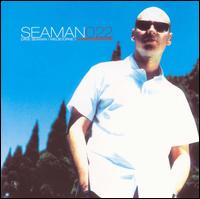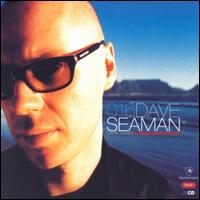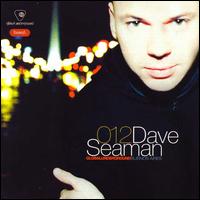

Courtesy of Dave Seaman

Global Underground

Global Underground

Global Underground
A FIRESIDE
CHAT WITH DAVE SEAMAN
I've
been to a few raves in my day and although I don't profess to be a dancing
machine, I got enough moves (most notably, the white man's overbite and
the swim) to warrant the attention of the ladies. I digress. I went to
a long and arduous one (as they all are) in the Angeles National Forest
and the track I heard entering the tent was a Dave Seaman mix. I like
the dance music and Seaman is good. Probably hung over and dead tired,
Seaman sat down with the Roadshow to talk about the life of a DJ, his
records, and his way with the ladies (what else is there in life), as
always, unedited and in his own words.
FRED JUNG: Let's start from the beginning.
DAVE SEAMAN: I don't know why, but I've wanted to be a DJ from as far
back as I can remember. I wanted to be a DJ from about the age of eight.
I was pretending to do radio shows in my bedroom. Right away, I was training
to be a DJ. It was something I always wanted to do. I was listening to
all kinds of pop music really. My parents were listening to the Carpenters
and Barry White and some things like that. When I was about twelve years
old, I started doing discos and my parents bought me some equipment and
then break dancing sort of happened. I got heavily into break-dancing
and that is how I got into dance music and the whole electro, turntable
culture and eventually house music. I was twelve when I did my first gig.
I spoke between the records and there was no mixing involved at all. I
have always had a love of music and I really didn't play an instrument.
I just loved records and my parents had lots and lots of records and I
used to listen to all their records. I used to record things off the radio
and so I had a love of music. I was asked to do someone's party because
I had a lot of records. Somebody said, "Do you want to play some
records at the party?" So it was like that really.
FJ: Did you actually break-dance?
DAVE SEAMAN: Yeah.
FJ: Don't tell me you were moonwalking?
DAVE SEAMAN: Yeah, I was just intrigued by the whole phenomenon really.
So a group of friends and I used to practice everyday. We would do city
centers on weekends. We'd do everything from windmills, to turtles, to
body popping and everything.
FJ: Do you still break out the moves to impress the ladies?
DAVE SEAMAN: Yeah, usually after a few drunken nights. After a few drunken
nights out and a few rum and cokes too many, I will end up doing it. My
friends are like, "Oh, there he goes again."
FJ: If we go back, way back to the Eighties, technology wasn't nearly
what it is now. The equipment was primarily on the low end, so how did
you compensate?
DAVE SEAMAN: When I had the mobile disco equipment, it was very basic.
I could sort of try and mix it up, but obviously, it was nothing compared
to pyrotechnics. To be honest, Fred, mixing wasn't something that I really
started to do until I was twenty, twenty-one and I really started to get
into that side of things, by which point I did have access to technics.
My friend went out and bought a pair and break-dancing went out. We went
through the phases of everything. We went through break-dancing. We went
through ice-skating. We went through BMXing. We went through a whole lot
and eventually got into technics and that one never really went away.
I learned how to mix and that has stuck with me for the last twenty years.
FJ: What was the first gig you worked?
DAVE SEAMAN: The first one that I ever worked was a club called Shelly's,
which is where Sasha really cut his teeth as well. I was working for Mixmag
(Seaman edited Mixmag). How I got into the business is another story entirely.
I sort of packed in deejaying for a while and went to London from the
north of England and started working for Mixmag. A photographer on the
magazine started called Shelly's and Sasha wanted to do three weeks. He
wanted to leave himself a Friday free. He asked me to the other Friday.
That was the first club I ever worked in really. I knew nothing at that
point.
FJ: How has the scene in Europe changed since that time?
DAVE SEAMAN: It is wildly different. You can't even compare the two really.
It wasn't even trendy or considered cool at all to be a DJ when I started.
The scene is as healthy as it has ever been really. It is on so many different
levels now. It is such a huge industry. It is such a huge, big business.
But as long as the underground keeps feeding the mainstream, a lot of
the big clubs are all really mainstream now. It is such a vastly different
thing. One of the best exports from the UK has been youth culture really.
Apart from hip-hop, most of the youth culture has come out of the UK,
be it rockers, punks, or Euro-romanticisms. It all stems from the UK base.
It is one of the few things that we are still good at. We have got such
a huge amount of people in such a small area that a big melting pots of
things develop very, very quickly, sometimes too quickly. So the scene
is constantly changing, constantly vibrant, constantly new generations
being thrown up with new enthusiasm and talent. It is more exciting now
than ever.
FJ: You referred to the underground feeding the mainstream, but as with
anything that is mainstream, after it has been sanitized for public viewing
and Madison Avenue has had its taste, the public will tire of it and it
will revert back into the underground.
DAVE SEAMAN: I think that it survives on so many levels now that I don't
think that is ever going to happen. People have always been going out
on a Friday or Saturday night to have a good time. Usually, they would
listen to a lot of commercial rubbish, a lot more pop, sort of mainstream
stuff, and even have a party record thrown in between. This is from a
European viewpoint anyway. Now, they don't have that. People who are going
out to clubs for the first time are not going to glitzy, chrome, palm
trees, and mirrors kinds of nightclubs. There is a much more purer kind
of dance music than the original pop stuff that they would listen to twenty
years ago. As for the underground feeding things, a lot of the time, it
is just things that have been rehashed. So much has been done in music
before that it is all about putting a new twist on it and I think underground
UK garage or big beat or whatever the new things are that have been thrown
up are things that have happened before, they have just been repackaged
for a new generation. That is the thing that you may have seen before,
but as new people come through them, they have got new enthusiasm. They
are bring new ideas and new talent into the scene and so it keeps on feeding
the snowballing monster that we have created.
FJ: Let's touch your edition to the Global Underground, Buenos Aires.
DAVE SEAMAN: It was based on the records that I was playing at the time.
That is what the Global Underground series is supposed to be about. I
think sometimes it veers off with various DJs, but it is meant to be about
the night. I played a lot of records. I was going to play in Buenos Aires.
I had played there before so I knew the kinds of stuff they were into.
I played all the records and went and had a fantastic night and about
seventy-five percent, eighty percent of the records are on there of all
the records that I played on the night. It is very representative of what
went on. Obviously, you can't play everything. You can't license everything.
So there has to be other records you have to put in there to fill the
gaps of the records that you couldn't license. That is why we can't ever
do the CDs live, really. You can only do it live if you have everything
licensed and you have the set worked out before. It was very much a reflection
of what went on that night in Buenos Aires.
FJ: Licensing is the biggest pain in the ass for any DJ.
DAVE SEAMAN: Yeah, a lot of the majors don't really understand, don't
really care to be honest about little compilations. Certainly, now they
are starting to wake up to the fact that these compilations are selling
units, but they are not willing to license their records for these compilations.
They want to start doing these compilations themselves, which is the way
major record companies work. They want the whole thing, not little bits
of something else.
FJ: What are some records you would like to get licensed?
DAVE SEAMAN: Oh, God, there has been lots. I wanted to use the Smashing
Pumpkins' "End is the Beginning," which was a Rabbit in the
Moon mix, which we went around the bend on to try and sort that one out
because it was from Warner Bros. and it was from a film and it never came
to fruition. I guess the main one would be the remix of Alanis Morissette
we did, "Uninvited." That has never come out in any form at
all. I guess she doesn't like it because I have tried just to get it on
a compilation album and it has still come back no. Again, I have tried
every publisher, management, and record company in every country. It is
still a no. A shut door on that one. So there are lots of them. That is
just two examples really.
FJ: I don't see what the hang up is, eventually, some entrepreneur with
a MIDI recorder can bootleg it and stick the damn thing on the internet.
DAVE SEAMAN: Yeah, exactly, you might as well do it legally and control
it.
FJ: And get paid for it.
DAVE SEAMAN: Exactly, it is crazy to me too, but that is the way it is.
FJ: What is the scene like in Buenos Aires?
DAVE
SEAMAN: It's varying all the time. Now, you can go anywhere in the world,
almost anywhere. There is an in joke among my DJ friends and colleagues
and that is where is the craziest place you can go and find a house scene.
I think you can go anywhere these days and find something going on. Buenos
Aries, for quite a while, was very, very underground. It is now starting
to get bigger with more and more DJs and more and more of the media accepting
the whole dance phenomenon. It is only like two or three clubs with a
fifteen hundred, two thousand capacity. They have got a regular thing
going on down there. It has still got that maverick spirit. In England,
in the UK, the media and the press is so huge now and it is so normal
to walk down the street and hear house music out of everybody's shops.
There is dance music all over the radio. There is several dance music
publications and the national press talks about dance music. In places
like Buenos Aires, it is still bit of a secret. It is still underground.
I think that is what makes it feel so fresh, whereas in the UK, it is
part of the wallpaper really.
FJ: In the States, the dance culture goes hand in hand with the rave scene
and all the baggage that comes with that.
DAVE SEAMAN: I think the rave scene is a fashion, whereas, dance music
transcends that. It is like hip-hop. People think these things are fashion
like the way Euro-romanticism or punk were and fashion and when the clothes
went out, the music died with it. Hip-hop transcended that and house music
will transcend that as well. The rave is just a fashion trend. In England,
it has gone full circle. We've had baggies and glow sticks going into
dressing up and being glam and then gone back glow sticks again. That
is just a fashion really.
FJ: What is the best thing about being a DJ?
DAVE SEAMAN: Lots of things. The best thing is connecting with the crowd.
That's what it is all about and when you feel like you are connecting
with everyone in the room all in one go, then you really feel like people
are into what you are doing and there is no bigger buzz in the world apart
from scoring a touchdown or a winning goal in the World Cup as we would
say.
FJ: Worse thing?
DAVE SEAMAN: The worse thing is when you don't connect (laughing). The
worse thing actually is some of the traveling can be a bit of a pain in
the ass, but it is not a lot to have to put up with really for all the
good side of things.
FJ: Do you get hit on a lot?
DAVE SEAMAN: Yeah, yeah, you can get a bit of that. It is a bit of a fallacy
really. You end up getting guys wanting to talk to you about how they
were listening to the records in 1988. Sweaty guys with their tops off
wanting to talk about records then you do girls hitting on you unfortunately.
But, yeah, you do get a bit of that.
Fred Jung is the Editor-In-Chief and is just Freddy from the block. Comments?
Email Him